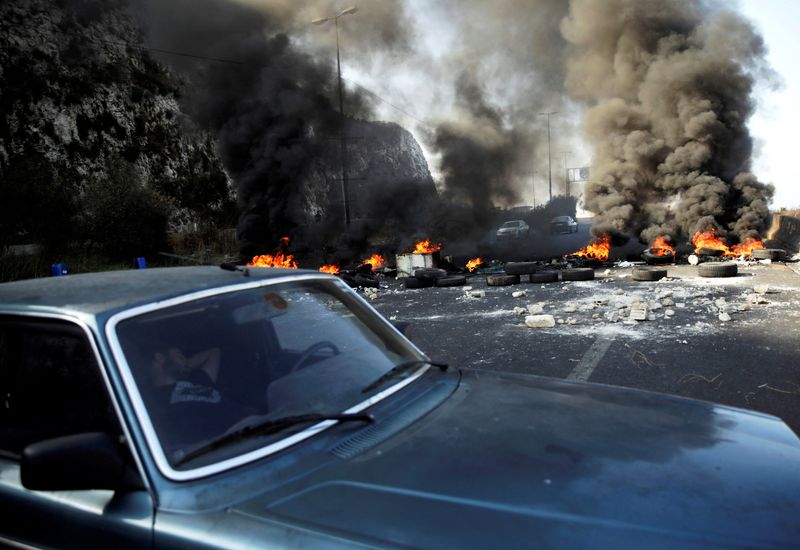BEIRUT (Reuters) - Lebanon marks the second anniversary on Thursday of the Beirut port explosion that killed 215 people and is widely seen as a symbol of corruption and bad governance by the sectarian ruling elite.
Here are some of the main crises over the past two decades in a country that has known little stability since the end of its 1975-90 civil war:
2005
Former premier Rafik al-Hariri is killed and 21 others die in a bomb attack on his motorcade in Beirut on Feb. 14.
Demonstrations erupt blaming the assassination on Syria, which deployed troops in Lebanon during the civil war and kept them there afterwards. Syria denies any role.
Syria's allies in Lebanon, who include the Iran-backed Hezbollah, stage rallies in support of Syria, but international pressure forces the troops out.
Three critics of Syria - Samir Kassir, Gebran Tueni, and George Hawi - are assassinated.
2006
In July, Hezbollah crosses the border into Israel, captures two Israeli soldiers and kills others, sparking a five-week war. At least 1,200 people in Lebanon and 158 Israelis are killed.
Tensions in Lebanon simmer over Hezbollah's arsenal. In November, Hezbollah and its allies quit the cabinet led by Western-backed Prime Minister Fouad Siniora and organise protests against it.
Anti-Syria politician Pierre Gemayel is killed.
2007
Hezbollah and its allies maintain a sit-in protest against the Siniora government for the entire year.
Anti-Syrian lawmakers Walid Eido and Antoine Ghanem are killed.
2008
A car bomb kills Wissam Eid, a police intelligence officer investigating the Hariri assassination, in January.
In May, the government outlaws Hezbollah's telecom network. Hezbollah calls this a declaration of war and its fighters take over mainly Muslim west Beirut. After mediation, rival leaders sign a deal in Qatar.
2011
A government led by Hariri's son and political heir, Saad, is toppled when Hezbollah and its allies quit due to disagreements over a U.N.-backed tribunal into the 2005 assassination.
2012
Hezbollah fighters deploy to Syria to aid President Bashar al-Assad in the country's civil war.
In October, a car bomb kills security official Wissam al-Hassan, whose intelligence service had arrested a pro-Syrian former minister charged with transporting Syrian-assembled bombs to wage attacks in Lebanon.
2013
A bomb kills ex-minister and Hariri advisor Mohamad Chatah.
2017
Sunni regional power Saudi Arabia, frustrated with Hezbollah's power in Lebanon, is accused of detaining Hariri in Riyadh, from where he unexpectedly resigned. Hariri had become premier again in 2016 in a deal in which Michel Aoun, a Hezbollah ally, became president. Both Riyadh and Hariri deny he was detained.
2018
Hezbollah and allies win a majority in Lebanon's first parliamentary vote since 2009.
2019
Despite growing economic troubles, the government fails to enact reforms that might unlock foreign support.
In October, a decision to tax internet calls ignites mass cross-sectarian protests accusing the ruling elite of corruption and mismanagement.
Hariri quits on Oct. 29. The financial crisis accelerates. Banks largely freeze depositors out of dollar savings. The local currency begins to crash.
2020
Hassan Diab becomes prime minister in January, backed by Hezbollah and its allies.
Lebanon defaults on its sovereign debt in March.
IMF talks flounder as ruling factions and banks object to a financial recovery plan.
On Aug. 4, a chemical explosion at Beirut port kills 215 people, wounds 6,000 and devastates swathes of Beirut.
The Diab cabinet quits. Hariri is designated to form a new government but cannot as parties squabble over portfolios.
A U.N.-backed tribunal convicts a Hezbollah member of conspiring to kill Rafik al-Hariri in 2005. Hezbollah denies any role.
2021
Poverty soars. Hariri gives up trying to form a government, trading blame with President Michel Aoun.
In August, the central bank declares it can no longer subsidise fuel. Shortages trigger violence at filling stations.
In September, Sunni tycoon Najib Mikati forms a government but it is paralysed by tension over the probe into the port explosion.
Hezbollah and its ally Amal demand the removal of investigating judge after he charges some of their allies. The Shi'ite parties call a protest and six of their followers are shot dead when violence erupts. Hezbollah blames the Lebanese Forces (LF), a Christian party; the LF denies this.
The investigation stalls amid a flood of legal complaints against the judge by officials whom he has charged over the disaster.
In October, Gulf states recall their ambassadors and Saudi Arabia bans all Lebanese imports in protest at comments by a pro-Hezbollah minister criticising Riyadh over the Yemen war.
2022
In January, the pound touches a low of 34,000 against the dollar, losing more than 90% of its value since 2019.
The World Bank accuses the ruling class of "orchestrating" one of the world's worst economic depressions.
Hariri declares he will not contest a parliamentary election.
In April, Lebanon reaches a draft IMF deal for a possible $3 billion in support, dependent on long-delayed reforms.
Gulf Arab ambassadors return, easing diplomatic tensions.
In May, Hezbollah and its allies lose their parliamentary majority in an election. But long-dominant parties maintain their grip, reappointing Shi'ite politician Nabih Berri and naming Mikati to form a new government.
The outgoing government approves a financial recovery plan. But banks reject it and Hezbollah says a new one is needed.
